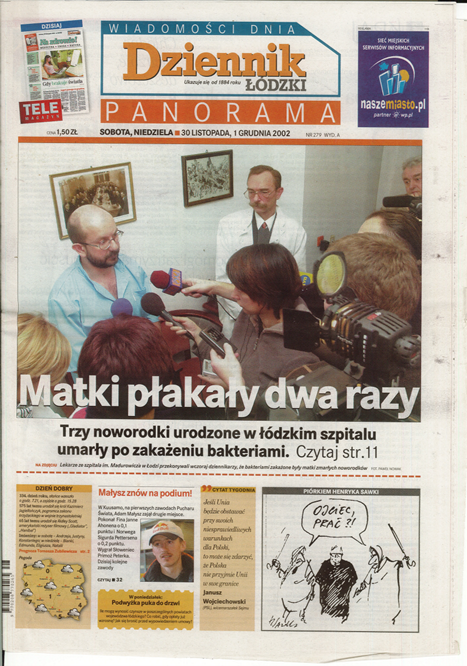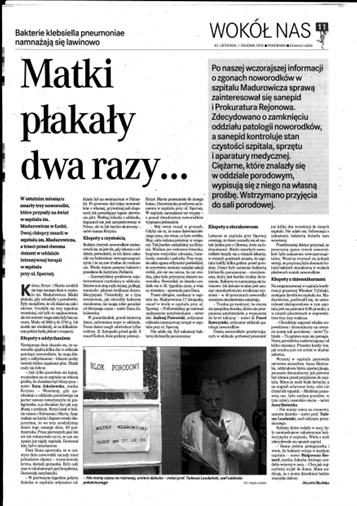- (000) 123 458 789
- office@worldpatientsalliance.org

PATIENT VOICES
Patient Safety and Advocacy
A Mother Cried Twice


Jolanta Bilinska
Klebsiella pneumoniae
Poland
My name is Jolanta Bilińska, and before I entered the world of patient advocacy, I worked as a journalist at the regional newspaper Dziennik Łódzki in Poland. At that time, I had no idea that my career and even my life’s purpose would take such a dramatic turn. It all began with one phone call that would change everything. An anonymous doctor contacted me and revealed a shocking piece of information: newborn babies had died in a hospital in Łódź because of an infection caused by Klebsiella pneumoniae.
At first, I found it difficult to believe. I reached out to the hospital director for clarification, hoping that this was perhaps a misunderstanding or an isolated incident. However, the explanation I received was dismissive. The director assured me that a few babies had died, but according to him, this was simply because they were weak. He insisted that there was no other reason behind their deaths. His words felt unconvincing, and I could not shake the feeling that the truth was being hidden.
As a journalist, I knew it was my responsibility to bring such information to light. I published the announcement in the newspaper, and very soon, my phone started ringing. Women began to call me, distressed and frightened. Many shared that babies were being delivered in Łódź and then transferred to other hospitals across the region, raising serious concerns. Over time, the true scale of the tragedy came to light: within a single month, 17 newborns had died, and 30 others had been infected. Despite these alarming numbers, there was no communication to families, no public information, and no meaningful action taken by authorities.
It was only after Prof. Waleria Hryniewicz, Director of the National Public Health Institute, intervened that a proper investigation began. She ordered exhumations, and all the mothers despite their grief agreed to this painful step in the hope of learning the truth. The findings confirmed what many had feared: the newborns had died because of Klebsiella pneumoniae. While this bacteria exists in every hospital, it should not have been deadly under normal circumstances. In this case, however, the environment in the hospital was dirty and unsafe. Even more shockingly, the hospital had undergone renovations without being closed down, exposing fragile infants to highly dangerous conditions.
The media campaign that followed placed enormous pressure on the authorities. Eventually, the Main Sanitary Inspector was forced to carry out inspections of neonatology departments in hospitals all across Poland. The investigations revealed that the problem was not limited to one hospital similar unsafe conditions were found in many other facilities.
As a result of this tragedy, an important decision was taken at the ministerial level: if three deaths occurred in any hospital within a short period, it would become mandatory to investigate the cause of death. While this was a positive step, it came too late for the grieving families. Each mother received €5,000 as compensation. At that time, it was considered a significant sum of money, but no financial support could ever replace the lives of their babies.
For me personally, this tragedy changed the course of my life. What began as an investigative story turned into a lifelong mission. I became a patient advocate, determined to prevent such avoidable tragedies from happening again. I shared my story with the World Health Organization, and they selected me to join the Patients for Patient Safety (PFPS) program as a champion. Through this platform, I connected with others who shared the same vision of safer healthcare systems.
Nearly twenty years have passed since those events, yet my passion for this work has never diminished. In 2006, I established the Patients Safety Foundation, and ever since, I have been actively working in the health field. The loss of those innocent newborns continues to fuel my dedication. Their story reminds us that every patient deserves safe care, and every life lost to preventable harm is a call to action.

